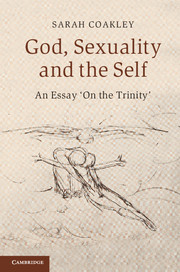Book contents
- Frontmatter
- Contents
- Illustrations
- Preface and acknowledgements
- Abbreviations
- Prelude: the arguments of this book
- Chapter 1 Recasting ‘systematic theology’: gender, desire, and théologie totale
- Chapter 2 Doing theology ‘on Wigan Pier’: why feminism and the social sciences matter to theology
- Chapter 3 Praying the Trinity: a neglected patristic tradition
- Chapter 4 The charismatic constituency: embarrassment or riches?
- Chapter 5 Seeing God: trinitarian thought through iconography
- Chapter 6 ‘Batter My Heart’: reorientations of classic trinitarian thought
- Chapter 7 The primacy of divine desire: God as Trinity and the ‘apophatic turn’
- Coda: conclusions and beyond
- Glossary of technical terms and names
- Scripture index
- General index
- References
Chapter 4 - The charismatic constituency: embarrassment or riches?
Published online by Cambridge University Press: 05 June 2014
- Frontmatter
- Contents
- Illustrations
- Preface and acknowledgements
- Abbreviations
- Prelude: the arguments of this book
- Chapter 1 Recasting ‘systematic theology’: gender, desire, and théologie totale
- Chapter 2 Doing theology ‘on Wigan Pier’: why feminism and the social sciences matter to theology
- Chapter 3 Praying the Trinity: a neglected patristic tradition
- Chapter 4 The charismatic constituency: embarrassment or riches?
- Chapter 5 Seeing God: trinitarian thought through iconography
- Chapter 6 ‘Batter My Heart’: reorientations of classic trinitarian thought
- Chapter 7 The primacy of divine desire: God as Trinity and the ‘apophatic turn’
- Coda: conclusions and beyond
- Glossary of technical terms and names
- Scripture index
- General index
- References
Summary
In the last chapter I outlined a complex thesis about prayer and the Trinity in the early church. I suggested, first, that there is a neglected, ‘alternative’ approach to the Trinity in this period, rooted textually in Romans 8 and manifested personally in the sustained activities of ecstatic or wordless prayer. But I also went on to suggest a set of sociopolitical associations with this ‘alternative approach’ which may account for the relative neglect of it – not just in the modern textbooks, but even amongst many of the early fathers themselves. The reason seemed to lie in this model’s potential, at least, for being charged with schism and subversion. If the prioritizing of the Spirit that it involved was given completely free rein, then sectarian revolt and tension with political authorities (such as in the case of the Montanist crisis) could ensue, and with them the splitting loose of the Spirit from what was later called homoousian equality and interaction with the Father and the Son: the Spirit was then granted specific, isolable effects and emotional tonalities. Hence, if my thesis is correct, it helps to explain the continuing anti-trinitarian tendency of many ‘sectarian’ forms of Christianity.
But if, on the other hand, the prayer-based model of the Trinity was maintained within the dominant ‘church’-type form of Christianity, especially as it became formally established in the empire, then another danger ensued. The subtlety of this model’s perception of the interactive operations of Spirit with Father in and through the ‘Christo-morphic’ pray-er (see again Romans 8. 15–17) was easy to miss or suppress; its particular insights into the incorporative and reflexive flow of divine desire in prayer were all too easily flattened out into a more conventional statement of what I called the ‘linear economy’ of much orthodox trinitarianism. Here, in contrast, there was a covert relegating of the Spirit to the safer position of the ‘third’ – subordinate in effect, if not in theological rhetoric.
- Type
- Chapter
- Information
- God, Sexuality, and the SelfAn Essay 'On the Trinity', pp. 152 - 189Publisher: Cambridge University PressPrint publication year: 2013



